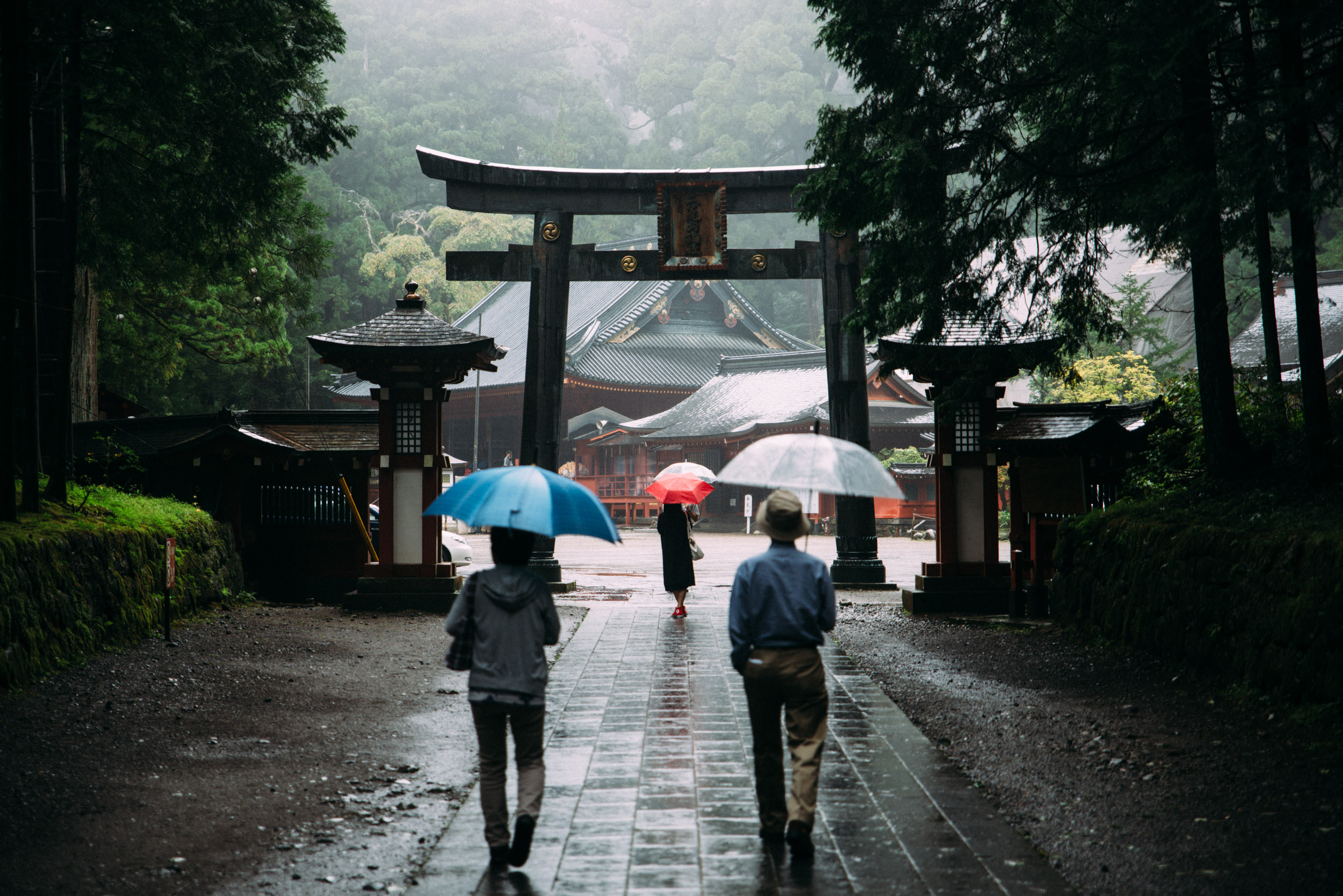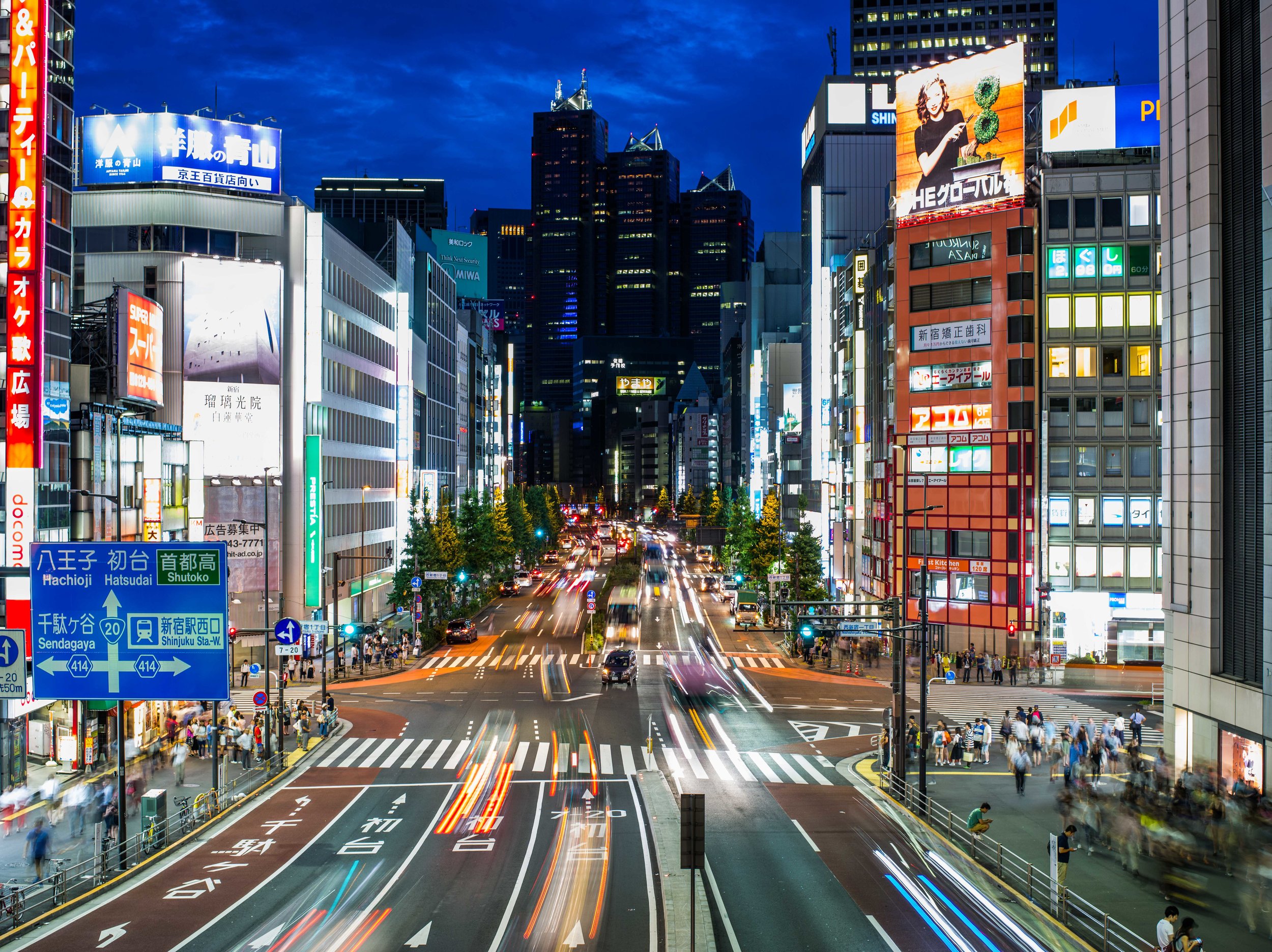What's the weather like in Tokyo? When is the best time to visit? Are the winters cold in Tokyo? Does it ever snow there? These are examples of question that I get all the time, so I figured the best way to answer it is in the future is to explain everything in a long blog post.
If you're looking for the tl;dr version it is this:
Tokyo is a destination worth visiting all year round except possibly during the summers, from late July until late September, while it is uncomfortably hot and humid.
For those of you who want to know the full story, let me guide you through all four (or should it be five?) seasons and what they have to offer.
Winters in Tokyo are often clear and crisp with plenty of blue sky days.
Winter (January, February and March)
The winters in Tokyo are quite comfortable. It rarely gets really cold (this is, of course, relative. Keep in mind that I'm born and raised in Sweden - where we have hotels built of Ice...). Snow is quite rare, and on the occasions, the white powder does fall from the sky, it more often than not tend to melt away within a day or two. The daily temperatures are between 5-10 degrees (C) and the weather is often clear. Getting a chance to see the iconic cone of Mt. Fuji from downtown Tokyo is quite likely during the winter months.
Cherry Blossom trees in bloom near Chidorigafuchi in central Tokyo
Spring (April, May and a bit of June)
Spring is very pleasant in Tokyo and often referred to as one of the best seasons to visit the Japanese capital. One of the reasons, besides the daytime temperatures hovering in the comfortable 15-25 degrees range, is because of Sakrua, the iconic Cherry Blossoms.
Cherry Blossom Season in Tokyo usually takes place around late March to early April. The exact dates can vary quite by a few weeks due to climate variations. Entities such as JMA (Japan Meteorological Agency) and train operators such as JR often does a fairly good job with predicting when the flowers will be blooming, and on what exact day they will reach "mankai" status, or "fully opened".
Personally, I don't really agree with what seems to be the consensus - that Tokyo is best experienced during cherry blossom season. And the reason is quite simple - There are simply too many tourists coming during that time. Sure, I get that wanting to experience this season first hand is high on many peoples bucket lists, but in that case, I would simply suggest doing so at a less crowded Japanese city rather than in the capital. Matsumoto in Niigata Prefecture and Sendai in Miyagi Prefecture are two good options for this. And whatever you do. Don't go to Kyoto during cherry blossom season as it's even (much) worse there than in Tokyo.
Don't panic if you are planning a trip to Japan primarily to see the cherry blossoms, but find last minute that the scheduled blooming doesn't align with your travel plans. Sakura moves as a pink belt from south to north across the Japanese islands. As long as you have a bit of flexibility in your itinerary, it should be quite easy to catch them somewhere. Also, remember that altitude plays a significant role. Even if you miss them in central Tokyo by as much as a week, you might be able to see some by heading to an elevated place, for example, Kawaguchiko near Mt. Fuji.
In 2019, the cherry blossoms in Tokyo started blooming on March 21st and reached their peak on the 27th. It's likely that the sakura forecast for 2020 will look quite similar.
Another detail to be aware of when it comes to spring in Japan is Golden Week, one of the longest stretches of national holidays of the entire year. For many Japanese, this is the longest holiday they will ever experience during the year. Shinkansen trains often run out of space, and airlines and hotels both inflate their prices significantly during Golden Week, so try to avoid it if you can.
In 2020, Golden Week will start on Wednesday, April 29 and end Tuesday, May 5. It's worth keeping in mind that many people also take another day or two off at the end or start (or both) of the consecutive national holidays.
So to conclude - the Japanese spring is great and a good time to visit, just remember that cherry blossom season, as well as Golden Week, are peak seasons for international and domestic tourism respectively.
Japan can be very beautiful in the rain. This photo was shot in Nikko, about 90 minutes from downtown Tokyo.
Rainy Season (June and July)
Right after the lovely spring comes "tsuyu", which is the Japanese word for the not-so-lovely rainy season. According to the Japan Meteorological Agency, Rainy season starts in Tokyo on June 8 and end on July 20.
Should Tokyo be avoided during rainy season?
In all fairness, rainy season is not that bad - it doesn't rain all the time (only approx 45% of the days sees any rain), and the weather is generally quite mild and comfortable. Personally, I much rather prefer the rainy season over summers in Tokyo, for example. It's worth remembering that the skies often are grey and gloomy during rainy season, so for those of you who are planning to visit primarily to shoot photographs, it may not be the best time of the year to visit. That being said, Tokyo can also look truly gorgeous in and after rain, so it's not all bad.
Rainy Season in Tokyo comes with the advantage of being a time when comparatively few tourists visit, which I definitely would consider a big plus. Hotel rooms are quite cheap, and you won't have to wait in long lines everywhere. Just make sure to pack shoes that will keep your feet dry, and invest in one of those plastic umbrellas, and you'll be fine!
Summer evening in Shinjuku
Summer (July, August, September)
In my humble opinion, this is by far the worst time to visit Tokyo. Both days and nights are sweltering hot, sometimes close to 40 degrees (C) and the humidity is sky-high. It all gets compounded by the heat island effect that is very real in Tokyo, with the city centre being a few degrees warmer than its less populated rural outskirts.
So what's it like to visit Tokyo in the summer?
Well, expect to be soaked in sweat a mere seconds after stepping outside no matter what time of the day it is. Remember to drink a lot and to always bring a towel (to wipe that sweat from your forehead before it enters your eyes). I often get very weak and sluggish during the summer months and do what I can to escape the country altogether for as much as possible during August and September.
The Tokyo Olympics is taking place in August 2020 and personally, I think it's very unwise that such an event is allowed to place during the hottest time of the year.
Besides the heat, there are also frequent typhoons hitting Japan during the summer months, which sometimes cause widespread damage, blackouts, chaos to the public transportation networks and sometimes also mass evacuations of people due to risks of floods and landslides.
An Autumn Icon - Maple leaves and the snow-covered peak of mt. Fuji. Shot at Kawaguchiko.
Autumn (October, November and a bit of December)
Autumn is another highlight of the year in Japan. The temperatures are back to comfortable levels, and the humidity is no longer offensive. One of my favourite activities this time of the year, is to head out to the mountains to the west of Tokyo and enjoy watching the colourful autumn foliage. Kawaguchiko, near Mt. Fuji is a personal favourite destination, but the mountains along the Chuo-Line (Takao-San, Mitake-San, Okutama etc.), as well as Mt. Oyama in Kanagawa Prefecture, are also well worth visiting.
Compared to spring, the number of tourists visiting Tokyo during autumn tends to be quite a bit more manageable, which is one reason I personally think it's the best time of the year to come here.
For current weather information, including information on typhoons, earthquake and other natural disasters, I recommend that you bookmark the English website of the Japan Meteorological Agency.





